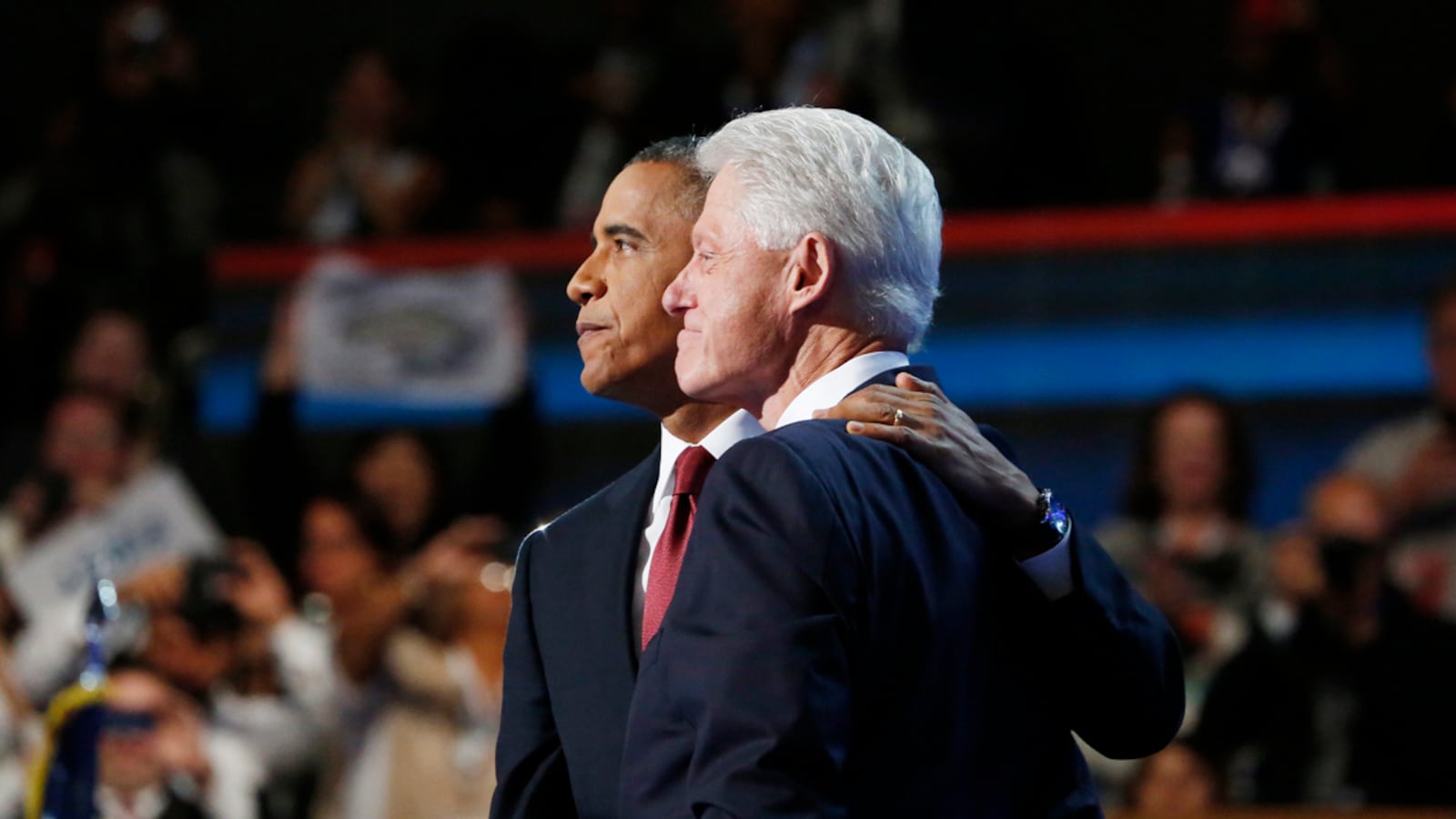I received an email from one of the smartest reporters around who asked, “What does it say about the POTUS that he didn’t even give the best speech of his own convention?” He was echoing the reaction of a broad swath of the pundit class. I replied, “I think it did just what it needed to do.”

In fact, President Obama and the Democrats in Charlotte did almost everything possible to advance their prospects in 2012—and while President Clinton was a big part of that, he turned in a performance on Wednesday night that kicked off the 2016 campaign.
First 2012. I wrote here that the relatively benign instant analysis of the Romney acceptance speech was way off the mark. Gallup soon informed us that it was by a wide margin the worst rated of the acceptance speeches the pollster has tested since 1996.
The Republican gathering in Tampa was like a business meeting—for the most part, emotionally and rhetorically arid. Just days later, Democrats rehabilitated the uses of eloquence. From the video tribute to Edward Kennedy through Obama’s proclamation that “the harder [path]… leads to a better place,” the president and his party proved anew that words—and images—have power.
There was Kennedy on film commanding a convention as he had so often in life—and then bringing the delegates to their feet as he rebuked Mitt Romney’s fervent claim during their 1994 Senate debate that he supported Roe v. Wade. “I am pro-choice,” Kennedy said. “My opponent is multiple choice.” There was Massachusetts Gov. Deval Patrick reprising the 2004 star turn of an Illinois state senator named Barack Obama—followed by the first Hispanic keynoter, San Antonio Mayor Julian Castro, touching deep and resonant chords with the story of his life, and his immigrant family’s. Then Michelle Obama delivered the best convention address ever by a first lady—not just saying but proving her point that while the president was changing the country, the presidency hadn’t changed him.
This wasn’t just a series of disconnected speeches. The Democrats were unfolding a narrative masterwork that connected Obama the person to the differences between him and Romney, while believably claiming that we are better off than four years ago—precisely because they didn’t overclaim. It was a message that would run through the entire convention, reinforced by the non-politicians who graced the stage—from workers who were victims of Bain to a mother whose daughter, born with a congenital heart defect, no longer faces the threat that her treatment will be cut off since Obamacare outlaws lifetime limits on insurance coverage. Women and reproductive rights—and LGBT Americans and gay rights—weren’t an afterthought, a half-hidden “interest group,” but in the platform and on the platform.
The stagecraft was worthy of Ronald Reagan’s image—meister Mike Deaver. It would even reach the once inconceivable point—with Joe Biden’s speech, and John Kerry’s, and veterans striding across the podium—where Democrats had and have the advantage on national security. And that wasn’t just about the death of Osama bin Laden, who, as Kerry observed, is not better off than he was four years ago. The GOP ceded—inexplicably, yes, idiotically ceded—the high ground here when their nominee failed to mention the war in Afghanistan or to deign to acknowledge the Americans fighting there and finally coming home.
For the Democrats, Wednesday night was indelible, and will be remembered and treasured for many conventions to come. When the big dog took and held the big stage, it was less a speech than a happening—spontaneous, mesmerizing, and as GOP strategist Alex Castellanos observed, “a moment that likely reelected Obama.” Bill Clinton explained the economy, health reform, the coming of the 2008 crash, tax fairness, regulation, the role of government—well, he seemed to explain nearly everything. And every step of the way, he talked about the president, this president—and not just himself. So did every other speaker; there was no reprise of the Romney-phobia that afflicted the GOP stars like New Jersey Gov. Chris Christie. Indeed Romney’s name was heard more often in Charlotte than in Tampa.
Some critics like The Daily Beast’s Michael Tomasky would later worry that Obama blew it in his own speech. What Tomasky “loved most” about Clinton’s speech was that he called out Republican lies on the issues like jobs and Medicare. It was “great stuff,” he argues—and it was. It was also Clinton’s assignment. He was often manically and happily off script, but never off message. He was supposed to take out the trash so Obama could turn to the future—not with grandiose promises, but with credibility and humility.
In fact, the president’s tempered approach tested well with voters who were dial-grouping the speech. So did his proposals, which this year didn’t match the scale of financial reform or health care. Instead, he talked of 100,000 new teachers and a million new manufacturing jobs in the next four years—ideas that scored high in the survey research and which are consistent with Obama’s commitment to government as a force for progress.
So Obama reached toward undecided voters while bringing an already fired-up convention to its feet. We will soon see numbers showing the so-called enthusiasm gap narrowing or even closing. This is a party that believes in itself and its nominee—unlike the other side, which grudgingly settled for Mitt. If Hispanics turn out, if women shift more decisively to Obama, then Romney has no road to the White House. And after this convention, that’s far less an “if” than a likelihood. At the same time, the president gave swing voters new reasons to stand with him.
You have to credit the Obama campaign—and the man at the top—with a remarkable degree of skill matched by coolness and nerve. All year long, they have refused to accept the Republican terms of reference for 2012—for an election as a simple referendum on the state of an economy that the GOP has worked mightily to hold back and mess up. The contest is now a choice, a word Obama and other speakers repeated constantly. The question is this: Who cares about the middle class, and who favors the few?
But coolness and nerve are not only measured in message discipline, but in the adversity of mistakes. The campaign—in this case, Obama himself—righted the initial platform’s omission of “God” and Jerusalem as Israel’s capital. Why on earth...? he asked—and directed that a fix be gaveled through. It was awkward, but far better than Romney’s fearful aversion to correcting the GOP’s proposed ban on abortion even in cases of rape and incest. Republicans will try to exploit the episode, but in the end, it may help Obama. He’s the one who ordered the change; voters will know it—and they know that they’re electing a president, not a platform.
The Obama campaign also ignored the warnings that Clinton couldn’t be trusted, that putting him front and center could be dangerous, that he wasn’t vetting his speech with them—and Obama’s might be compared unfavorably with his. The president and his advisers understood this wasn’t a high-school oratorical contest.
In contrast, the Romney enterprise tried to play their own Clinton card all summer. Obama was no Clinton, they said, elevating the man their party had once despised with equal fervor and rushed to impeach. They turned Clinton into a kind of referee. They reinforced his standing with Americans battered by the Bush economic collapse. The night he spoke in Charlotte, he took with him into the klieg lights a 69 percent approval—his highest rating ever. Having validated Clinton, the Romneyites then watched him pulverize their race-baiting fraud that Obama has undone the work requirements of welfare reform—so he can give more taxpayer money to you know who. Clinton, who signed welfare reform into law, set the record straight with a smile and an accessible, unquestioned authority enhanced by the Republicans’ crocodile praise for the former president.
Did they really think he would diss Obama, or shortchange him—or do anything but support him wholeheartedly? They misread the man and the politics. A top GOP strategist commented to me, “Politics is so much like chess, and so many people play checkers.”
The Obama campaign understands this. And so does someone else. Bill Clinton’s formal role on Wednesday was to nominate the president. In reality, he delivered two nominating speeches. He nominated Obama this year—and Hillary in 2016. Despite past enmities, he genuinely hopes to see Obama win because he believes it’s right for the country. And he knows it’s right for Hillary.
He wants her to run. As one Clintonite recently reported, she says she doesn’t want to, but he thinks that after a year out of her job as secretary of state, to borrow a phrase, she’ll be fired up and ready to go. Her odds of victory then will be higher if Obama prevails now—despite a speculative mini-storm that preceded the Charlotte convention. In The New Yorker, “two people with direct knowledge” were quoted saying that Bill Clinton’s top aide, Doug Band, was voting for Romney—to help Hillary.
I don’t doubt two people said it to the reporter, but they don’t know much about politics. Band is anything but stupid. He and Clinton have both certainly read and almost certainly credit the assessment of Clinton’s college classmate and former Treasury Undersecretary Roger Altman that within four years, “it is possible that the U.S. economy will surprise on the upside…[with] growth beyond the 2.5 percent that is widely seen as its long-term potential. In other words, the famine could be followed by a feast.”
Whoever is inaugurated on Jan. 20, 2013 would preside over that feast. How could Hillary defeat a President Romney in a time of prosperity? She would be imminently stronger running to succeed a President Obama whose policies have finally brought the nation through.
The polls in coming days will record the bounce for Obama. But the bounce that could count most in a base election has already happened. Democrats are galvanized by the best convention in modern history—by Bill Clinton’s fiery appeal and by Barack Obama’s finely tuned and targeted acceptance address that lifted both the delegates and the dials of ordinary voters.
The Republicans not only impeached Bill Clinton—and tried but failed to convict him in the Senate. They scorned and smeared Hillary Clinton when she was the first lady. Now they speak kindly of both—at least they did until Charlotte. So maybe after four more years of Obama in the White House, they’ll like eight more years of the Clintons back in the White House.
Maybe she won’t run, but I can see it coming. What a week in politics: Obama bounces—and Clinton announces.






